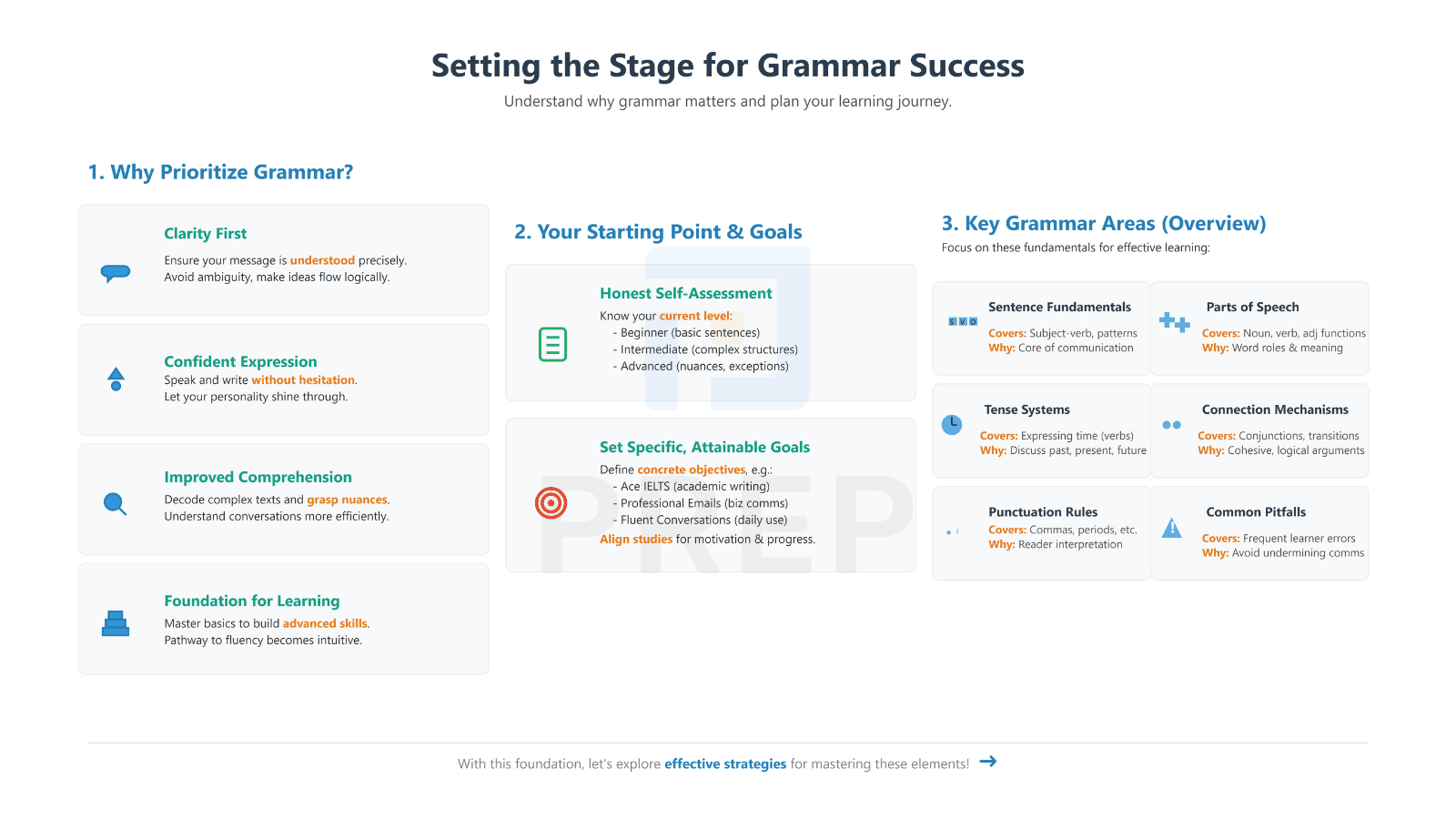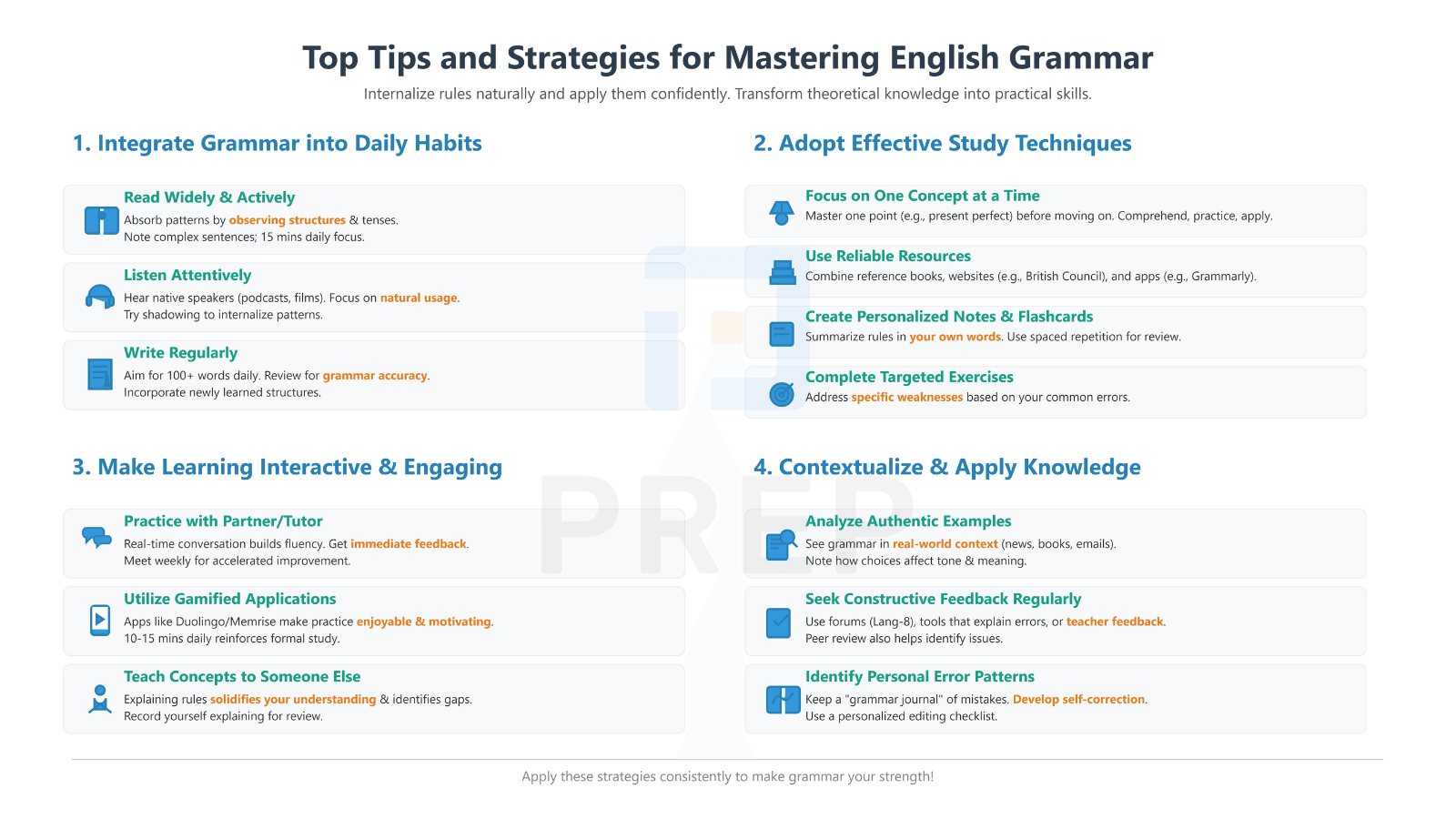Unlock Clear Communication: Actionable Tips to learn English Grammar Effectively
English grammar forms the backbone of clear communication in today's interconnected world. Whether you're preparing for an international exam or simply want to express yourself more confidently, mastering grammar fundamentals can transform your language proficiency. This comprehensive guide offers practical strategies to help you learn English grammar effectively and apply it in everyday situations.

I. Setting the Stage for Grammar Success
Before diving into specific techniques, let's establish why grammar matters and how to approach your learning journey strategically.

1. Why Prioritize English Grammar? Understanding the Impact
Grammar provides the essential framework that supports all language skills. When you learn English grammar properly, you gain several key benefits that directly enhance your communication abilities:
Communication clarity comes first and foremost. Proper grammar ensures your message gets across exactly as intended, eliminating ambiguity and confusion. When you construct sentences correctly, your ideas flow logically from one to the next.
Confidence in expression follows naturally. With solid grammatical knowledge, you'll speak and write without second-guessing yourself, allowing your personality and ideas to shine through rather than being hindered by uncertainty.
Comprehension improves dramatically as well. Understanding grammar patterns helps you decode complex texts and conversations more efficiently, grasping nuanced meanings that might otherwise be missed.
A strong foundation for advanced learning emerges once basic grammar is mastered. Each new rule builds upon previous knowledge, creating a structured pathway toward fluency that becomes increasingly intuitive over time.
2. Identifying Your Starting Point and Goals
Effective grammar learning begins with honest self-assessment. Consider your current proficiency level—whether you're a beginner struggling with basic sentence formation, an intermediate learner refining more complex structures, or an advanced student working on nuanced details and exceptions.
Setting specific, attainable goals significantly impacts your motivation and focus. Rather than aiming vaguely to "improve grammar," define concrete objectives. Are you preparing for the IELTS exam, hoping to write more professional emails, or aiming to speak more fluently in everyday conversations? Each goal requires different emphasis and practice methods.
For instance, understanding academic writing structures and formal grammar will be paramount if you're preparing for IELTS. If business communication is your target, mastering professional email formats and precise vocabulary becomes essential. By aligning your grammar studies with these specific purposes, you'll maintain motivation and see relevant progress faster.
3. Key Grammar Areas to Focus Your Learning On (Overview)
To learn English grammar effectively, concentrate on these fundamental areas:
|
Grammar Area |
What It Covers |
Why It Matters |
|
Sentence Fundamentals |
Subject-verb relationships, basic patterns |
Forms the foundation of all English communication |
|
Parts of Speech |
Functions of nouns, verbs, adjectives, adverbs, etc. |
Clarifies how each word contributes to meaning |
|
Tense Systems |
How English expresses time through verb forms |
Enables precise discussion of past, present, and future |
|
Connection Mechanisms |
Conjunctions, transitions, and relative clauses |
Develops cohesive paragraphs and logical arguments |
|
Punctuation Rules |
Commas, periods, semicolons, apostrophes |
Affects how readers interpret your writing |
|
Common Pitfalls |
Frequent errors made by English learners |
Helps avoid mistakes that undermine communication |
Now that we've established what to learn, let's explore practical strategies for mastering these grammar elements effectively.
II. Top Tips and Strategies for Mastering English Grammar
The following approaches will help you internalize grammar rules naturally and apply them confidently in real-world communication. These basic grammar tips transform theoretical knowledge into practical communication skills.

1. Integrate Grammar into Daily Habits
-
Read widely and actively to absorb grammar patterns naturally. Don't just consume content passively—pay attention to sentence structures, verb tenses, and word relationships. Note interesting or complex sentences in a dedicated notebook, analyzing why they work grammatically. Just 15 minutes of focused reading daily exposes you to more authentic grammar usage than hours of textbook study.
-
Listen attentively to native speakers in various contexts. Podcasts, interviews, films, and lectures provide excellent exposure to natural grammar in action. Listen specifically for how native speakers use tenses, conditionals, or question forms in real conversation. Try shadowing techniques—repeating exactly what you hear with the same intonation and rhythm—to internalize these patterns physically.
-
Write regularly with grammatical awareness. Whether through daily journal entries, emails, or social media posts, aim to produce at least 100 words of English writing daily. After writing, review your work specifically for grammar accuracy. Challenge yourself to incorporate recently learned structures intentionally, turning theoretical knowledge into practical skill through consistent application.
2. Adopt Effective Study Techniques
-
Focus on one concept at a time until mastery. Grammar comprises interconnected elements, but attempting to learn English grammar all at once leads to confusion. Dedicate 3-5 days to a single grammar point (e.g., present perfect tense) before moving to another. Begin with comprehension exercises, progress to controlled practice, and finally incorporate the structure into free writing or speaking.
-
Use reliable resources that match your learning style. Grammar reference books like "Practical English Usage" by Michael Swan provide authoritative explanations, while websites like British Council Learn English offer interactive exercises. Grammar apps such as Grammarly help identify error patterns in your actual writing. Combine resources that explain rules clearly with those that provide ample practice opportunities.
-
Create personalized grammar notes and flashcards. The act of summarizing rules in your own words significantly enhances retention. For each grammar point, create a simple card with the rule on one side and personal examples on the other. Review these cards using spaced repetition systems—reviewing difficult items more frequently than mastered ones—to optimize memory consolidation.
-
Complete targeted exercises that address your specific weaknesses. Generic grammar drills have limited value. Instead, analyze your common errors from past writing or speaking, then seek exercises specifically addressing those issues. If you consistently misuse articles, for instance, focus practice on this area before moving to grammar points you already handle confidently.
3. Make Learning Interactive and Engaging
-
Practice with a conversation partner or tutor who provides grammar feedback. While solo study builds knowledge, real-time conversation develops fluency and reveals gaps in grammatical understanding. Meet weekly with a language exchange partner or professional tutor who can correct errors tactfully while maintaining conversational flow. This combination of practice and immediate feedback accelerates improvement dramatically.
-
Utilize gamified applications that make grammar practice enjoyable. Apps like Duolingo and Memrise transform grammar exercises into engaging challenges with progress metrics and reward systems. These platforms leverage the psychology of achievement to maintain motivation through difficult learning phases. Spend 10-15 minutes daily on these apps to reinforce formal study with enjoyable practice.
-
Teach grammar concepts to someone else to solidify your understanding. Explaining rules to another person—whether a fellow learner or simply an imaginary student—forces you to clarify your own knowledge. This teaching technique identifies gaps in your understanding and strengthens neural connections associated with the grammar point. Record yourself explaining a grammar rule, then review the recording for accuracy and clarity.
4. Contextualize and Apply Your Knowledge
-
Analyze authentic examples from real-world sources to see grammar in context. Collect sentences from newspapers, books, or professional emails that illustrate specific grammar points. Analyze why certain structures are used in particular contexts, noting how grammar choices affect tone and meaning. This analytical approach helps you move beyond mechanical rule-following to purposeful communication.
-
Seek constructive feedback on your grammar usage regularly. Submit writing samples to online forums like Lang-8 or work with grammar-checking tools that explain errors rather than simply correcting them. Professional feedback from qualified teachers provides the most valuable insights, but peer review also helps identify recurring issues that may not be evident to you.
-
Identify personal error patterns and develop targeted self-correction strategies. Keep a "grammar journal" documenting mistakes you repeatedly make, along with the correct versions. Review this journal weekly, noting any improvement or persistent challenges. Establish a personalized editing checklist based on your common errors to use when proofreading important communications.
III. Enhancing Your Learning Journey: FAQs and Next Steps
As you implement these basic grammar tips, you may encounter questions about the learning process. Here are answers to common inquiries about how to learn English grammar effectively.
1. Common Questions About Learning English Grammar Effectively
-
Is it better to learn grammar rules explicitly or acquire them naturally through exposure? Both approaches have merit and work best in combination. Explicit rule learning provides clarity and precision, while natural acquisition through reading and listening builds intuitive understanding. Most successful learners employ structured study to understand rules, followed by extensive exposure that transforms that knowledge into automatic habits.
-
How long does it take to master English grammar fundamentals? Reaching intermediate grammar proficiency typically requires 6-12 months of consistent study (30-60 minutes daily), though this varies based on your starting level, language background, and study methods. Rather than focusing on timeline, measure progress by your ability to communicate with increasing accuracy in real situations.
-
Should I learn British English grammar or American English grammar? The core grammar rules are nearly identical between these variants, with differences primarily in punctuation preferences and certain verb forms. Choose based on your specific needs—if you'll work primarily with Americans, focus on American English; if preparing for Cambridge exams, learn British conventions. Most importantly, maintain consistency within a single piece of writing.
-
How can I remember irregular verbs and exceptions to grammar rules? Group irregular verbs by pattern (e.g., ring/rang/rung, sing/sang/sung) rather than alphabetically. Create memorable sentences using multiple irregular forms. For exceptions to rules, connect them to vivid mental images or personal experiences rather than trying to memorize them as isolated facts.
2. Sustaining Your Grammar Growth Beyond the Basics
As your grammar foundation strengthens, explore advanced concepts like subjunctive mood, inversion structures, and cleft sentences that add sophistication to your expression. Pay increasing attention to style alongside correctness—how grammar choices affect tone, formality, and impact.
Remember that language learning represents a continuous journey rather than a destination. Even native speakers continue refining their grammatical precision throughout life. By implementing these English grammar tips consistently, you'll develop not just technical accuracy but the confidence to express yourself clearly and effectively in any English-speaking context.
To learn English grammar effectively requires strategic focus, consistent practice, and practical application. By integrating these tips into your language journey, you'll develop stronger communication skills that serve you in academic, professional, and personal contexts. The effort invested in mastering grammar fundamentals will pay dividends through more precise, confident, and impactful expression.

Hi I'm Chloe, and I am currently serving as an Product Content Administrator at Prep Education. With over five years of experience in independent online IELTS study and exam preparation, I am confident in my ability to support learners in achieving their highest possible scores.
Comment
Premium content
View allPersonalized roadmap
Most read












